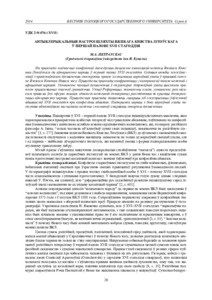Please use this identifier to cite or link to this item:
https://elib.psu.by/handle/123456789/1602Full metadata record
| DC Field | Value | Language |
|---|---|---|
| dc.contributor.author | Петраўскас, М. А. | - |
| dc.date.accessioned | 2014-03-25T07:48:33Z | - |
| dc.date.available | 2014-03-25T07:48:33Z | - |
| dc.date.issued | 2014 | - |
| dc.identifier.citation | Вестник Полоцкого государственного университета. Серия A, Гуманитарные науки: научно-теоретический журнал. – Новополоцк: ПГУ, 2014. - № 1. - С. 28-32. | ru_RU |
| dc.identifier.issn | 2070-1608 | - |
| dc.identifier.uri | https://elib.psu.by/handle/123456789/1602 | - |
| dc.description | M.A. Petrauskas (Grodzenskі Dzjarzhaўny Ўnіversіtjet Іmja Ja. Kupaly). М.А. Пeтраускас (Гродзенскі Дзяржаўны Ўніверсітэт Імя Я. Купалы) | en |
| dc.description.abstract | На прыкладзе маёмасных канфліктаў даследуецца дачыненне каталіцкай шляхты Вялікага Княства Літоўскага да аўтарытэту царквы ў першай палове XVII стагоддзя. Судовыя цяжбы землеўласнікаў з прадстаўнікамі духавенства ілюструюць працэс легітымацыі царкоўнай улады ў прававой сістэме Вялікага Княства Новага часу. Прыведзены прыклады канфрантацыі і кампрамісаў паміж шляхтай і афіцыйнай царквой. Узмацненне пазіцый духавенства ў структурах дзяржаўнай улады выклікала пратэст прывілеяваных пластоў грамадства. Уплыў Рэфармацыі, эканамічны эгаізм, узмацненне ролі свецкага права ва ўсіх сферах жыцця, ідэалогія шляхецкай дэмакратыі разглядаюцца як крыніцы дэсакралізацыі аўтарытэту царквы. Прыведзеныя прыклады дазваляюць гаварыць аб секулярызацыі ўяўленнняў абывацеляў XVII стагоддзя пра канфесійны абавязак. Падтрымка царквы з боку вярхоўнай улады паступова абмяжоўвала магчымасці шляхты і магнатаў ігнараваць інтарэсы духавенства. = On the example of property conflicts explores the attitude of the Catholic gentry to the authority of the church in the first half of the XVII century. The litigation between landowners and clergymen illustrates the process of legitimizing the ecclesiastical authority in the legal system of the GDL of the Modern times. There are the examples of confrontation and compromise between the nobility and the official church. Strengthening the position of the clergy in the governance structures caused protest of the privileged strata of society. The influence of the Reformation, the economic self-interest, the role of the civil law in all spheres of life, the ideology of szlachta democracy are named as the sources of authority desacralization of the church. These examples suggest the ideas of the secularism in the attitude of XVII century inhabitants to the confessional duty. The support of the church by the supreme power gradually limited the opportunities of the gentry and magnates to ignore the interests of the clergy. | ru_RU |
| dc.language.iso | be | ru_RU |
| dc.publisher | Полоцкий государственный университет | ru_RU |
| dc.relation.ispartof | Веснік Полацкага дзяржаўнага ўніверсітэта. Серыя А, Гуманітарныя навук | be_BE |
| dc.relation.ispartof | Herald of Polotsk State University Series A, Humanity sciences | en_EN |
| dc.relation.ispartof | Вестник Полоцкого государственного университета. Серия A, Гуманитарные науки | ru_RU |
| dc.relation.ispartofseries | Серия A, Гуманитарные науки;2014.- № 1 | - |
| dc.rights | open access | ru_RU |
| dc.subject | Исторические науки | ru_RU |
| dc.subject | шляхта | ru_RU |
| dc.subject | церковь | ru_RU |
| dc.subject | секуляризация | ru_RU |
| dc.title | Антыклерыкальныя настроі шляхты Вялікага Княства Літоўскага ў першай палове XVII стагоддзя | ru_RU |
| dc.type | Article | ru_RU |
| Appears in Collections: | 2014, № 1 | |
Items in DSpace are protected by copyright, with all rights reserved, unless otherwise indicated.
